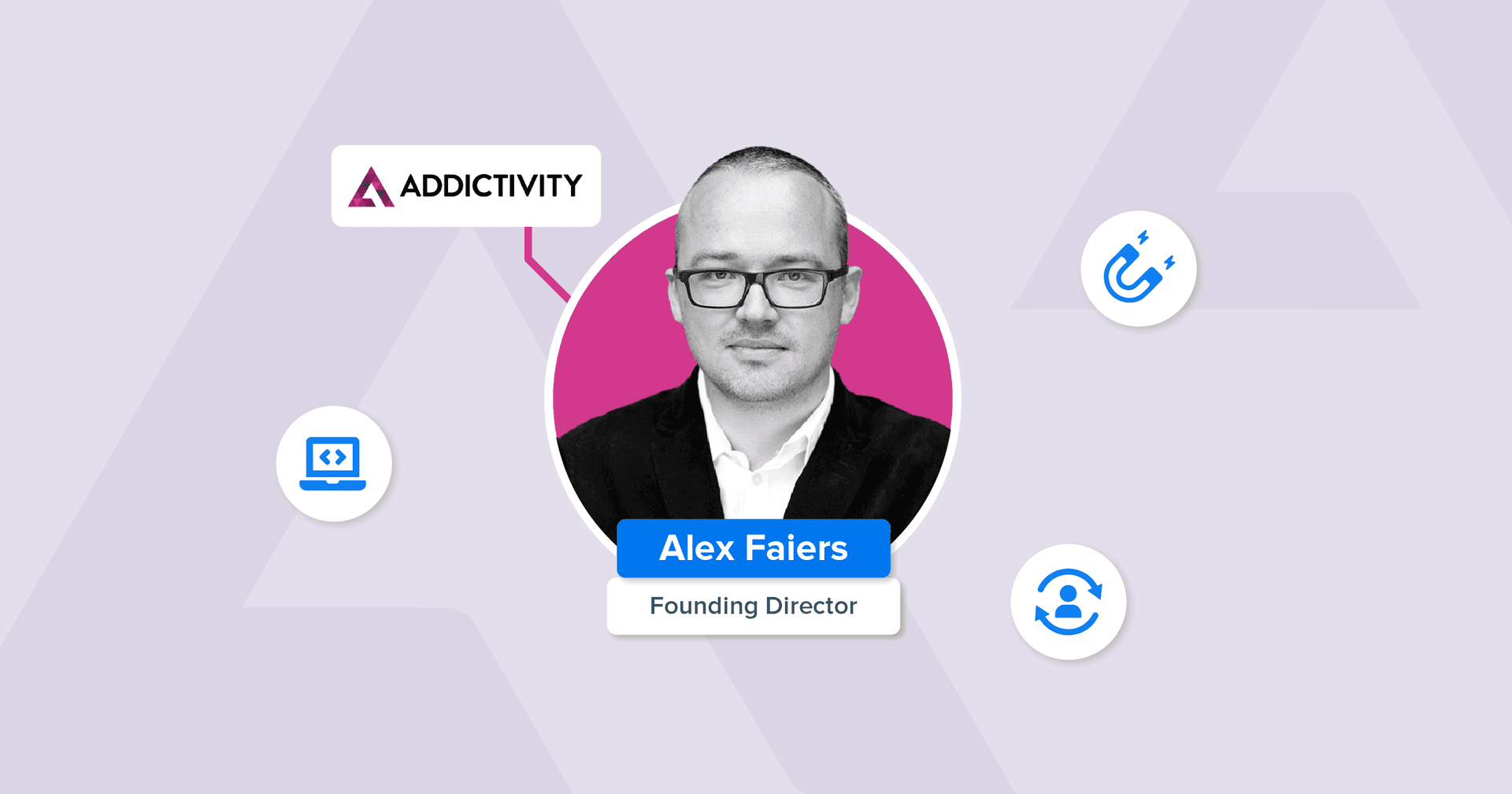Table of Contents
Table of Contents
- What Is A Mentor in an Agency Context?
- Why Mentorship Is Important For Agency Leaders
- Benefits of Mentorship for Agency Leaders
- How To Find and Choose a Mentor
- Tips for Building a Successful Mentoring Relationship
- The Benefits of Being a Mentor
- Agency Strategies To Build a Culture of Mentorship
- Empowering the Leaders of Tomorrow Through Mentorship
7,000+ agencies have ditched manual reports. You can too.
Free 14-Day TrialQUICK SUMMARY:
The value of mentorship for agency leaders is significant, providing professional growth and guidance. A digital marketing agency mentor offers expertise in strategy, client management, and business growth. This article shares how mentorship shapes a collaborative culture, highlighting how it helps agency leaders navigate challenges and realize the transformative impact of this important relationship.
For many agency leaders, the entrepreneurial journey marks their first foray into management and leadership. The path, while exciting, is often fraught with uncertainties and questions. How do you know if you're steering the ship in the right direction?
In 2004, Vallene Kailburn and her husband Miles loaded their Chevy S-10 compact pickup and set sail for the American West. They landed in Fort Collins, Colorado, where a burgeoning interactive media and website design career led Vallene to co-found Old Town Media (commonly known as OTM) with Miles in 2007.
Seventeen years later—with Vallene as Chief People Officer and Miles as Chief Executive Officer—OTM has evolved from a small web shop into a full-service creative consultancy serving some of Northern Colorado’s most prominent local businesses.

Setting sail: OTM co-founders Vallene and Miles Kailburn with their two children. (Credit: OTM)
The journey hasn’t always been easy. Vallene likens some moments as a business owner to being stranded on an island, isolated. This is where having a lifeline in the form of a mentor has been instrumental in helping her plan a course through uncharted waters.
During challenging times, having a mentor who understands the intricacies of such a role is immensely comforting. Having a mentor has been a game-changer, offering me support, guidance, and insights that have significantly contributed to my personal and professional development.
Vallene Kailburn, Chief People Officer, OTM
Mentorship is not just about having someone to turn to for advice when things get tough; it's about fostering a relationship that illuminates the path to success and personal and professional growth.
What Is A Mentor in an Agency Context?
Mentors are seasoned professionals and visionaries who have navigated the ebbs and flows of their industry. Some of the world’s most successful individuals have benefited from mentoring relationships.
Maya Angelou helped Oprah build relationships early in her career.
Steve Jobs assisted Mark Zuckerberg in reconnecting with his mission.
Warren Buffett advised Bill Gates on time management and philanthropy.
Steven Spielberg provided fan and fellow film director J.J. Abrams with career support and opportunities.
In the agency world, mentors provide guidance and insight into the nuances of marketing strategies, client management, and agency growth. These mentors come armed with stories of triumphs and setbacks, offering advice that is both theoretical and grounded in real-world experiences.
Differences Between Coaching, Mentoring, and Sponsoring
It's essential to distinguish between mentoring, coaching, and sponsoring, as each plays a different role in professional development.
Coaching
More immediate and skill-specific, coaching involves helping individuals find their own answers and overcome obstacles. In this setup, both the coach and the coachee drive the relationship and reach out to each other.
Mentoring
Whether through formal or informal mentoring programs, mentoring focuses on long-term career and psychosocial support, offering guidance based on personal experiences. The mentee drives the relationship, and the mentor’s role is to react and respond.
Sponsoring
This scenario involves a senior stakeholder advocating for a protégé, using their influence to open doors and advance the protégé's career. The sponsor drives the relationship by advocating for the protégé and championing their work with other senior leaders.
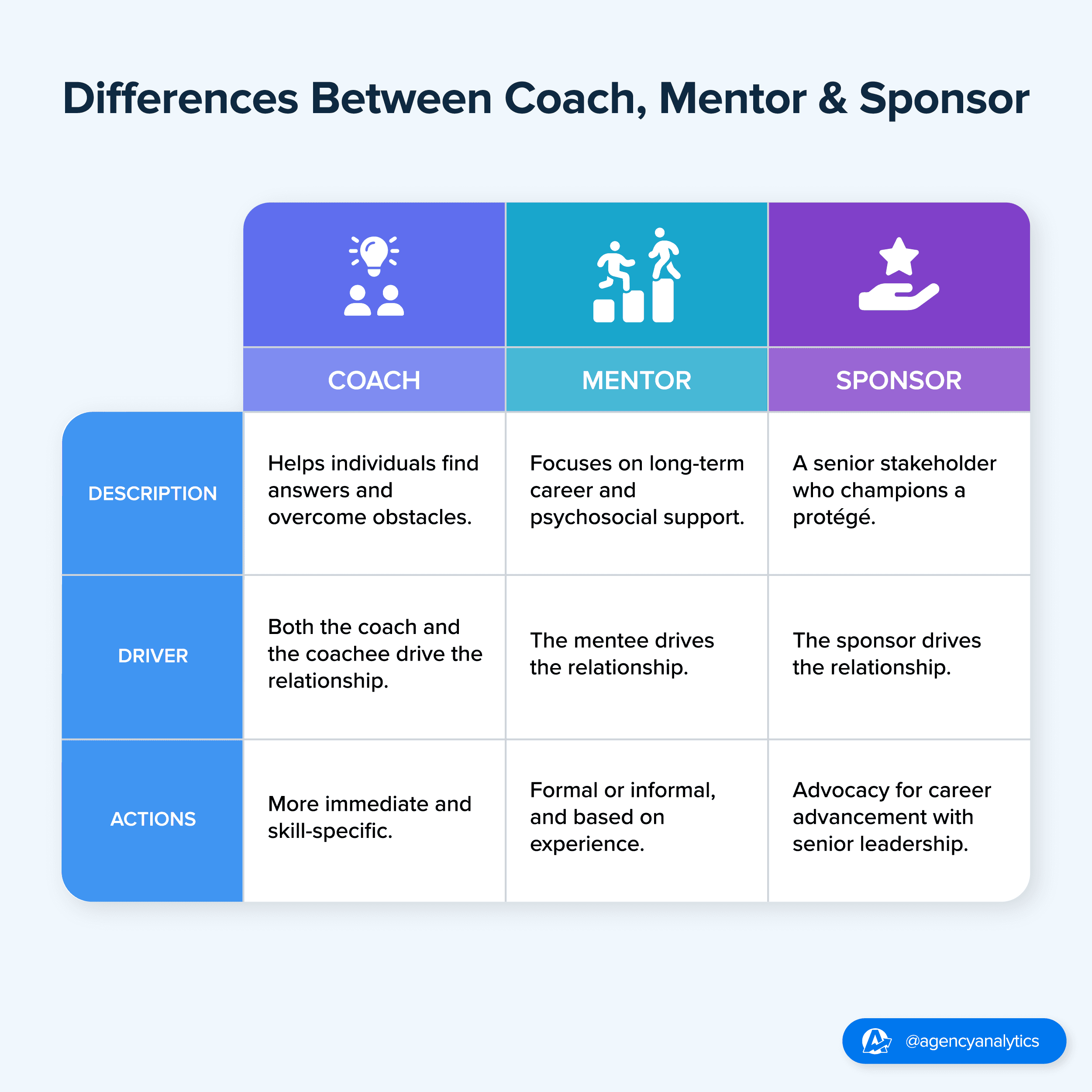
Why Mentorship Is Important For Agency Leaders
First-time leaders often find themselves at a loss on the turbulent seas of entrepreneurship and leadership—every decision feels like a life-or-death gamble. They look to their business elders and can’t help but wonder, “How will I survive this?”
In Treasure Planet, Disney’s criminally underrated re-imagining of Robert Louis Stephenson’s classic novel Treasure Island, the young protagonist Jim Hawkins gets a pep talk from his mentor, space pirate Long John Silver, at a critical point in his character arc:
“You got the makings of greatness in you, but you gotta take the helm and chart your own course! Stick to it, no matter the squalls! And when the time comes, you'll get the chance to really test the cut of your sails and show what you're made of! And... well, I hope I'm there, catching some of the light coming off you that day.”

Long John Silver and Jim Hawkins in Disney’s Treasure Planet (2002).
A mentor serves as a stable and reassuring beacon in the leadership storm. Mentors offer guidance from their own experiences, helping new leaders circumnavigate common pitfalls and tailor their strategies for success. During moments of rapid change or crisis, mentors provide valuable big-picture perspectives, helping agency leaders see a path forward when the skies turn cloudy.
Case in point: David Metcalf’s career didn’t start in digital marketing as we know it today. The products he sold with his first company, DiskBank, were physical CD-ROMs.
When iTunes changed the face of music distribution in the early aughts, and Apple began phasing out optical disk drives from its computers, Metcalf questioned what he was meant to do.
But Metcalf, who had benefited from a mentor relationship for several years, rapidly found his footing at a pivotal point in his career and launched a new marketing agency, Distl.
Distl is now home to more than 25 employees and runs 75+ campaigns in its mission to “build Australia’s most unstoppable brands.”
Early in my career, I was fortunate to have an extremely patient and wise mentor. What stood out to me was that they never told me what to do; rather, they would share experiences relevant to my situation and allow me to learn from them. To this day, I do my best to model this in my leadership style.
David Metcalf, Managing Director, Distl
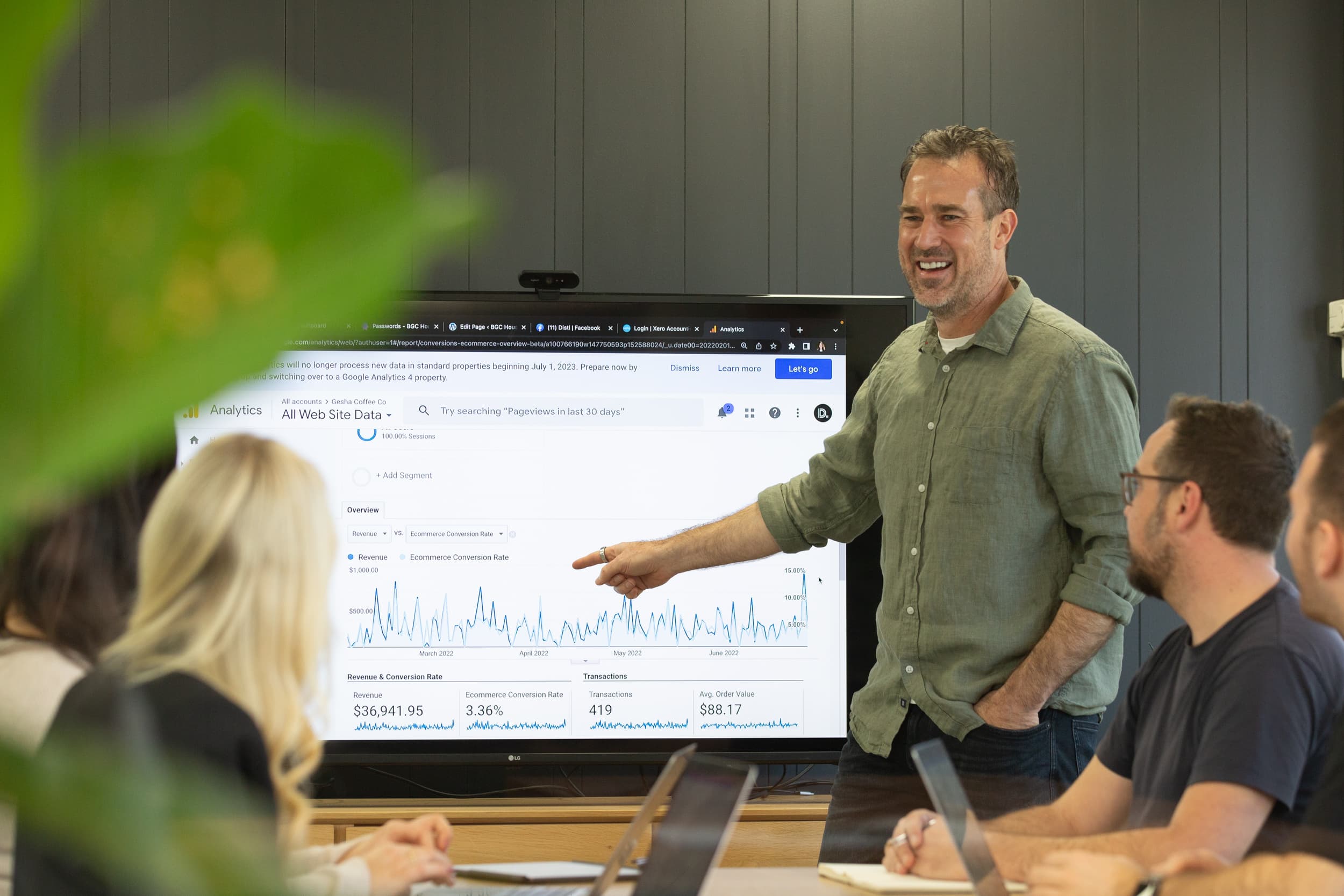
Distl managing director David Metcalf sharing his insights with his team. (Credit: Distl)
In an industry where trends and best practices evolve rapidly, having a mentor means having a reliable source of current, relevant advice and time-worn practices from which to source inspiration.
Benefits of Mentorship for Agency Leaders
Ben Spray has always had a combative spirit. A former UK mixed martial arts amateur champion, Spray is no stranger to stepping into the ring—or should we say, the octagon—to deliver results for his clients.
His digital marketing agency, We Are Marketable, espouses a vision summed up in four hard-hitting words: “FAST. IMPACTFUL. REBELLIOUS. RESULTS.”
Working closely with an experienced mentor for several years has been a boon for We Are Marketable. Case in point: Spray says that in the first year after working fully with his mentor, his company increased profit by 150%.
Parts of my business would not have grown as well as they did without my mentor's advice. Accountability is hugely important, and having someone who has been through it and succeeded is so valuable.
Ben Spray, Managing Director, We Are Marketable

Ben Spray (left) coaches a fellow team member. (Credit: We Are Marketable)
Mentorship offers several benefits for agency leaders:
Perspective and Wisdom: Career mentors provide insights to navigate complex situations, acting as a sounding board for ideas.
Enhanced Leadership Skills: Regular mentorship interactions sharpen leadership qualities like empathy and strategic thinking.
Expanded Professional Network: Mentors introduce leaders to new networks, opening doors to opportunities and collaborations.
You will get results faster—they have been there, so it's easy to relate and be real. You know your mentor has the experience you want to gain.
Ben Spray, Managing Director, We Are Marketable
Impress clients and save hours with custom, automated reporting.
Join 7,000+ agencies that create reports in minutes instead of hours using AgencyAnalytics. Get started for free. No credit card required.
How To Find and Choose a Mentor
It’s clear that mentorship offers countless benefits for marketing agency leaders. But here’s the catch: You’ll only reap the rewards if you find a mentor who’s a solid match for your needs.
Your mentor needs to offer relevant experience, subject matter expertise, and–perhaps most importantly–a personality and teaching style that gels with your preferences.
Calum Maxwell has more than 20 years of experience in business development, and educating and sharing knowledge with others is woven into the very fabric of his being.
Today, Maxwell leads a team of 10 employees at Optimise Online, an agency running 40+ campaigns with services including SEO, social media marketing, web design, and brand strategy.
In the early days of Optimise Online, Maxwell worked with Dave Clare, a renowned speaker, thought leader, business coach, and author of Simplified, “the book that makes leadership simple.” Maxwell says Clare’s expertise was instrumental in helping the agency define its purpose, mission, vision, and values, and positioning Maxwell for success as a business leader.
At such a crucial stage of our agency's growth, this collaboration laid a strong foundation for a business that deeply resonates with our customers and team. Thanks to this strategic alignment, we're not just delivering services; we're on a mission to make a positive impact in the world.
Calum Maxwell, CEO & Founder, Optimise Online
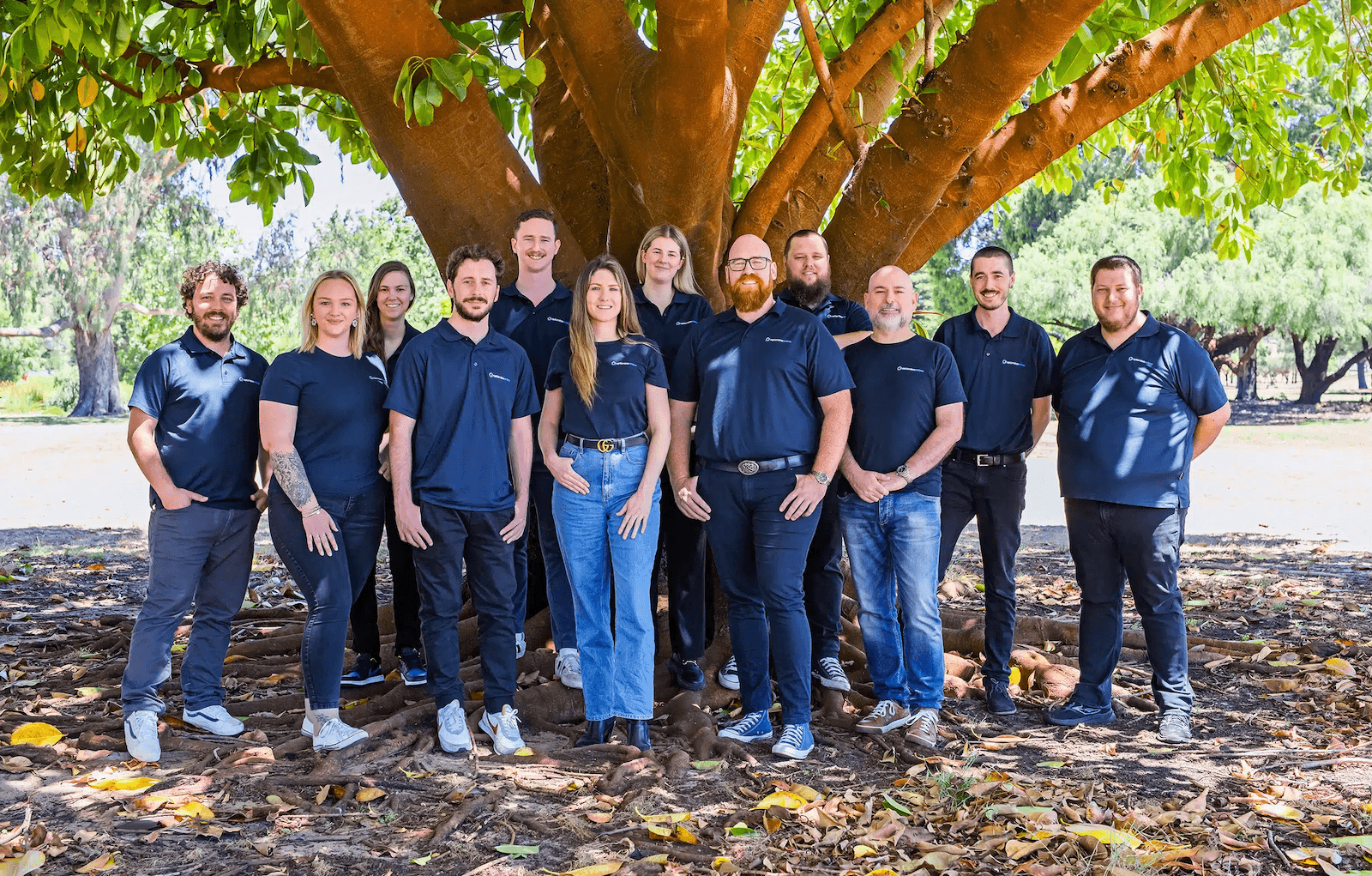
Calum Maxwell (middle) with his team. (Credit: Optimise Online)
If you’re ready to look for a mentor, here are some key steps to choose the right one for you:
1. Define Your Goals and Needs
Understand what you want to achieve with a mentor. This could be:
Improving specific marketing skills.
Understanding new marketing trends.
Receiving career guidance and progression.
Learning how to navigate challenges in the industry.
Starting with a deep understanding of your intentions will allow you to measure the success of your mentoring relationship.
2. Leverage Your Network
Use your professional network to find connections to potential mentors. LinkedIn is a valuable tool for this. Engage in marketing groups, attend industry events, and participate in webinars or workshops.
3. Use Formal Mentoring Programs
Some professional organizations, like the American Marketing Association, offer mentorship programs. These are great resources to find mentors in your specific area of expertise.
4. Identify Potential Mentors
Look for individuals with a career path or expertise that aligns with your goals. This could include:
Senior professionals in your current workplace.
Leaders in other companies or marketing agencies.
Academics or experts who frequently publish in your area of interest.
Speakers at marketing conferences or events.
My experience has been to look for a mentor who exhibits similar values and has a clear track record of the personal and career effectiveness that matters most to me.
David Metcalf, Managing Director, Distl
5. Research Your Potential Mentors
Learn about their career path, achievements, and contributions to the marketing field. This will help you understand how they will help you and provide some good talking points when you reach out.
6. Reach Out Tactfully
When contacting potential mentors, be respectful of their time. Introduce yourself, explain why you admire their work, and clearly state what you seek from the mentorship. Be specific about why they would be a great mentor for you.
7. Be Open to Different Types of Mentorship
Mentorship doesn't always have to be a formal, one-on-one relationship. It also comes in the form of following someone's work, reading their publications, or attending their talks.
Type of Mentorship | How It Works |
|---|---|
One-on-One Mentoring | A classic mentor-mentee relationship offering personalized guidance and career advice. |
Peer Mentoring | Professionals at similar career stages share insights and support each other. |
Group Mentoring | One mentor guides a group of mentees, fostering a collaborative learning environment. |
Reverse Mentoring | Junior employees mentor senior staff, often in areas like digital innovation. |
Flash Mentoring | Short, focused sessions concentrate on specific topics or skills. |
Team Mentoring | Multiple mentors guide a group—typically used for project-specific guidance. |
8. Prepare for Rejection and Keep Trying
Not everyone will have the time or interest to be a mentor, and that's okay. If someone declines, thank them for their time, and continue your search.
9. Follow Up and Establish a Relationship
Once you find a mentor, follow up and establish how the mentorship will work. Discuss how often you'll meet and what each of your expectations are.
10. Give Back
Remember, a successful mentor relationship is a two-way street. Consider what you offer your mentor, even if it's just a fresh perspective or assistance in an area they need to become more familiar with.
The more time and effort I give and receive, the more I will inspire rapid growth in myself and others.
Calum Maxwell, CEO & Founder, Optimise Online
Tips for Building a Successful Mentoring Relationship
Maximizing your mentorship experience requires active engagement, clear communication, and a willingness to learn and grow.
I make the most of the relationship by having clear goals. The first two meetings were intense as my business was torn apart, and the negatives were shown in the full light of day, which was hard to take. But after we tore everything down, we got to building it up. This is where I got the most out of it: He helped me plan the scaling and growth of the agency.
Ben Spray, Managing Director, We Are Marketable
Here are essential tips to make the most out of your mentorship:
Set Clear Objectives
Before starting the mentorship, identify your goals. These objectives should be measurable, achievable, specific, time-bound, evolving, and relevant (MASTER). Share these goals with your mentor to ensure alignment.
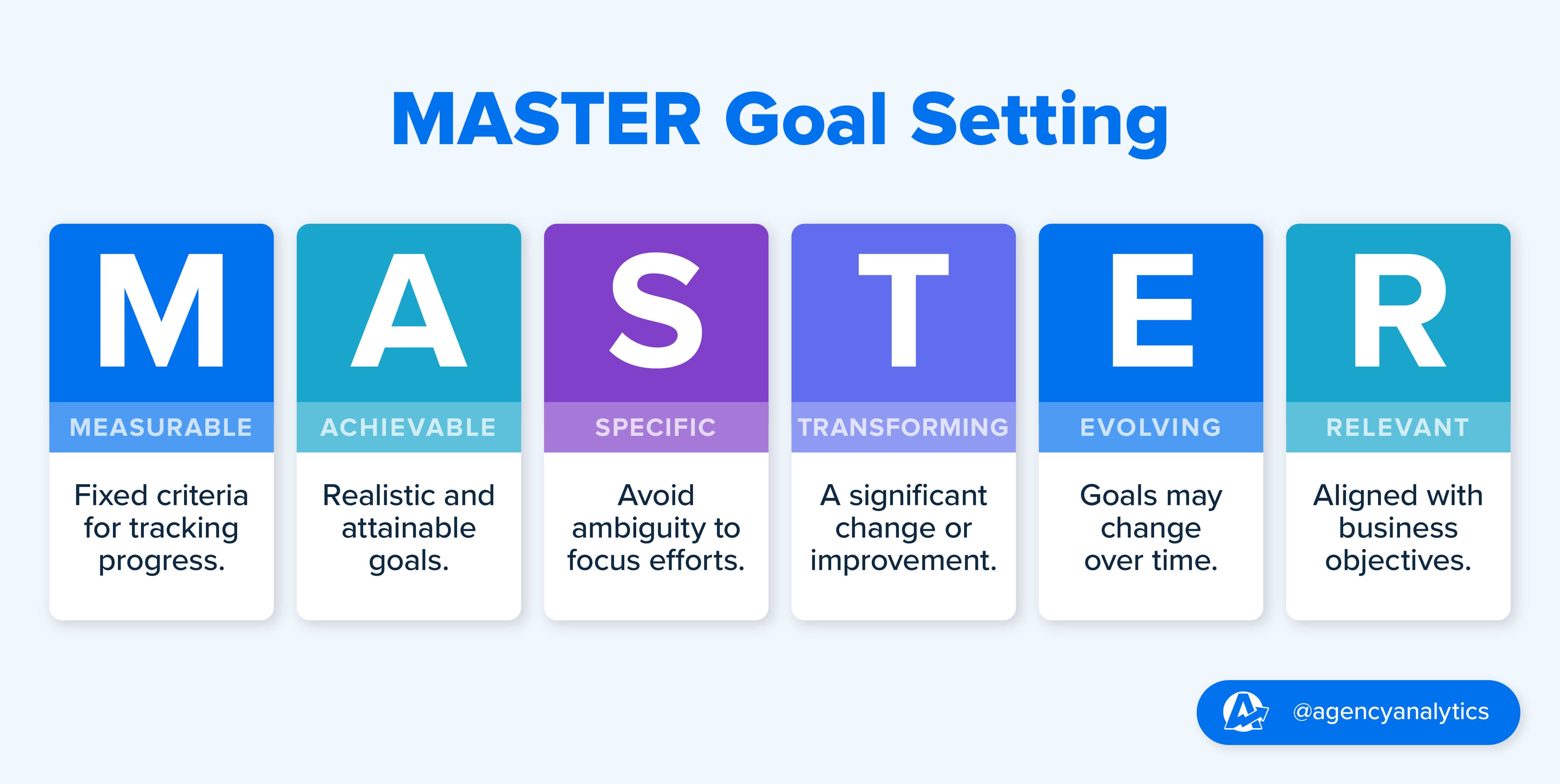
Prepare for Meetings
Respect your mentor's time by being well-prepared for each meeting. This could include having a list of questions, updates on your progress, and topics you want to discuss.
Act on Advice and Feedback
Be open to constructive criticism and show your mentor that you value their input by acting on their advice. Implement their suggestions where appropriate and discuss the outcomes in subsequent meetings.
Maintain Regular Communication
Consistency is vital in a mentoring relationship. Keep in touch with your mentor regularly, whether it's through formal meetings, emails, or informal catch-ups.
Keep Track of Your Progress
Regularly review your goals and the progress you’ve made. This helps you stay on track and allows you to see how your mentor’s guidance impacts your career development.
Be Respectful of Your Mentor’s Time
Understand that your mentor is a busy professional. Be punctual for meetings, keep your communications concise, and be flexible with scheduling.
Share Your Achievements and Challenges
Knowledge transfer is mutually beneficial. Keep your mentor informed about your successes and challenges. This helps them understand your journey better and provide more tailored advice.
Network and Leverage Additional Resources
If your mentor suggests connecting with other professionals, use the opportunity to expand your network. Also, take advantage of any resources or opportunities they recommend.
Evaluate the Mentorship Periodically
Does the mentorship relationship meet your expectations? Are your goals being addressed? This evaluation will help you and your mentor make the necessary adjustments.
Show Gratitude
Express appreciation for your mentor’s time and guidance. A simple thank you note or acknowledgment of their impact will go a long way.
Know When To Move On
Finally, recognize that mentorship relationships evolve. There might come a time when you’ve outgrown the relationship or achieved your objectives. It’s important to acknowledge this and part ways amicably when the time comes.
The Benefits of Being a Mentor
One of Vallene Kailburn’s most fulfilling career experiences as a mentor was witnessing the remarkable journey of OTM’s very first employee. She distinctly recalls the day he walked into the office for an interview, dressed in a full suit—a testament to his eagerness and professionalism despite his youth.
At that time, the employee was still in college, brimming with enthusiasm and a hunger to learn. For five years, Kailburn and the employee embarked on a mentoring journey that extended beyond the ins and outs of running a marketing agency. They delved into the intricacies of life, imparting not only professional guidance but also life lessons.
Fast forward to today, and this once eager young professional has become a bigwig at AgileBits (the creator of 1Password).
His ascent to a leadership position is a testament to his dedication, hard work, and the guidance he absorbed during our mentorship. What's even more rewarding is seeing him pay it forward as he has become a mentor himself, guiding and shaping the journeys of others in their professional pursuits.
Vallene Kailburn, Chief People Officer, OTM
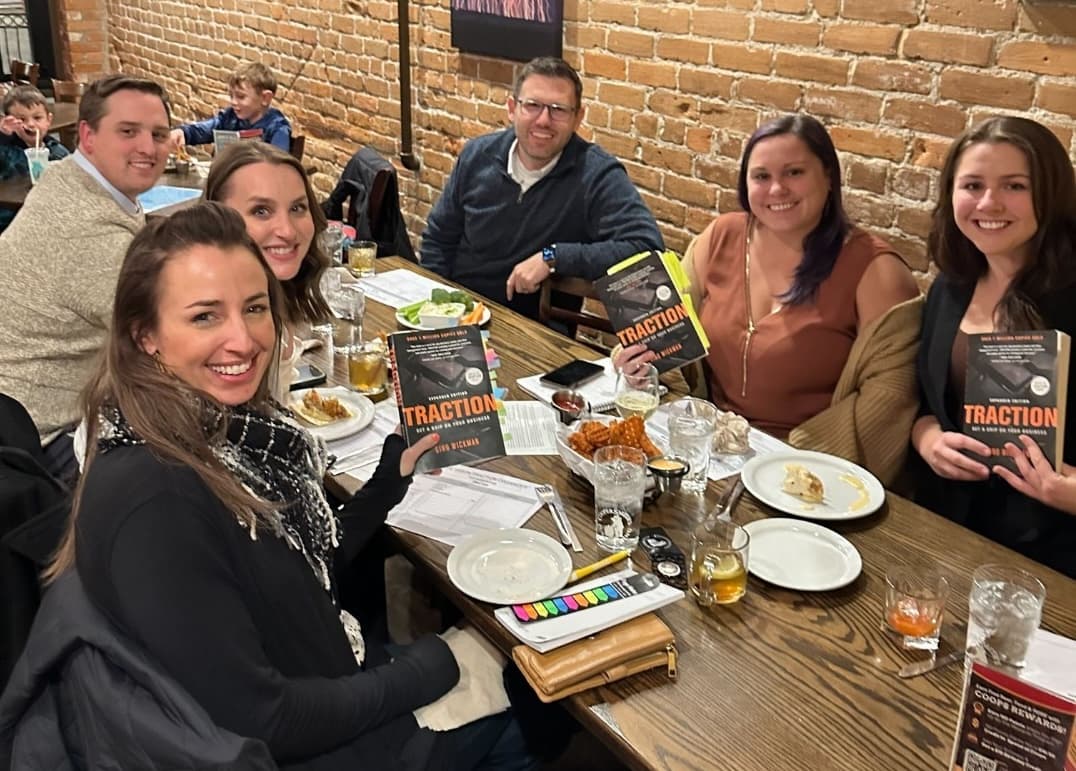
Vallene Kailburn (left) hosting a business development book club with the OTM team. (Credit: OTM/Instagram)
The mentoring relationship is symbiotic. While mentees gain invaluable insights and guidance, mentors also reap benefits. They get the opportunity to refine their leadership skills, stay connected with emerging trends, and experience the fulfillment that comes from aiding another professional's growth.
For marketing agency leaders, mentorship is about more than just imparting wisdom; it's about mutual growth and personal development. Being a mentor is as much about teaching as it is about learning and reflecting.
Here are five key benefits of being a mentor:
1. Professional and Personal Growth
As a mentor, you are constantly challenged to stay abreast of the latest trends and developments in the industry. This continuous learning keeps you sharp.
2. Developing Leadership Skills
Guiding mentees requires patience, understanding, and the ability to inspire and motivate. These key leadership skills are honed through the process of mentoring.
I make the most of a mentor relationship by applying the framework from the book The Coaching Habit: Say Less, Ask More & Change the Way You Lead Forever by Michael Bungay Stanier. I encourage my mentees to share what's on their minds or their challenges. While I share my experiences, my primary focus is on working collaboratively with them to help find solutions to their problems.
Vallene Kailburn, Chief People Officer, OTM
3. Expanding Networks
Engaging with mentees often expands your professional network as you get introduced to new people and ideas.
4. Professional and Personal Fulfillment
A deep sense of fulfillment comes from helping someone else navigate their career path and achieve their goals.
The most rewarding aspect of being a mentor is the opportunity to impart valuable advice and insights that I wish I had known at that stage in life. Offering guidance beyond the immediate challenges they face and sharing lessons that have shaped my journey is a fulfilling experience.
Vallene Kailburn, Chief People Officer, OTM
5. Fresh Perspectives
Younger employees or less experienced mentees offer fresh perspectives and insights, challenging established ways of thinking and sparking innovation.
Agency Strategies To Build a Culture of Mentorship
Integrating a culture of mentorship within a marketing agency transforms workplace dynamics and boosts overall productivity and morale.
Here is a list of strategies to effectively introduce mentorship in your agency:
Assess the Need: Understand the specific mentoring needs within your agency. Is it for leadership development, skill enhancement, or career progression?
Design a Structured Mentoring Program: Create mentoring programs with clear objectives, guidelines, and expected outcomes. This might include matching mentors and mentees based on specific criteria, setting up regular check-ins, and providing resources like mentoring software for both the mentee and the mentor.
Train the Mentors: Offer training sessions for mentors to equip them with the skills needed to guide mentees effectively. This includes communication techniques, goal-setting strategies, and ways to provide constructive feedback.
Promote a Mentorship Culture: Encourage a culture where seeking guidance and learning from others is valued. Share success stories and testimonials to illustrate the impact of mentorship.
Evaluate and Adapt: Regularly assess the effectiveness of the mentorship program and make adjustments as needed. Feedback from participants is key in this process.
Empowering the Leaders of Tomorrow Through Mentorship
As the tales of Vallene Kailburn, David Metcalf, Ben Spray, and Calum Maxwell reveal, the agency leader’s journey is akin to navigating the open seas—full of adventure, challenges, and discovery. Their experiences underscore a fundamental truth: In the turbulent waters of agency leadership, mentors are the stars guiding the way.
Embracing the role of mentor or seeking mentorship leads to career advancement, personal growth, and a more vibrant, collaborative workplace culture. Whether receiving or giving mentorship, the process requires commitment, but the rewards are well worth the investment.
The one thing we spend and can't earn back is time, so spend it wisely. I spend it on learning, growing, and developing myself and those around me.
Calum Maxwell, CEO & Founder, Optimise Online
What Maxwell says closely echoes what another great fictional mentor, the wizard Gandalf, told young hobbit Frodo in The Lord of the Rings: “All we have to decide is what to do with the time that is given us.”
Mentorship in agency leadership is about taking the time to build legacies, inspire change, and leave a mark on businesses and lives. For every agency leader venturing into the unknown, your mentor is your guide to help you uncover the greatness within and lead you to the shores of success and beyond.

Written by
Francois Marchand brings more than 20 years of experience in marketing, journalism, content production, and artificial intelligence (AI). His goal is to equip agency leaders with innovative strategies and actionable advice to succeed in digital marketing, SaaS, and ecommerce.
Read more posts by Francois MarchandSee how 7,000+ marketing agencies help clients win
Free 14-day trial. No credit card required.






